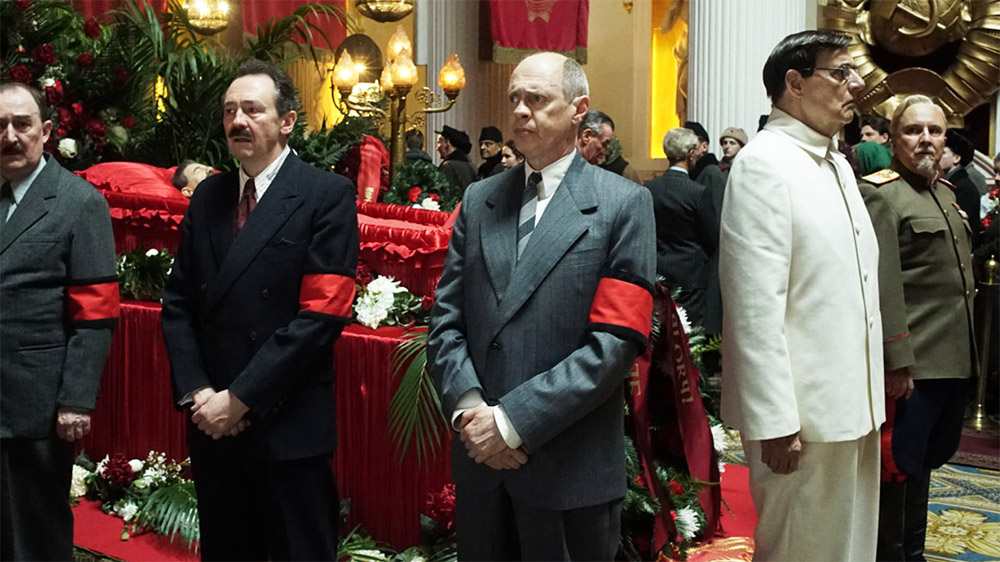If you’re going to make a film that will likely insult an entire country, you’d better make certain it holds up. With Veep creator Armando Iannucci at the helm, along with a star-studded cast including comedy royalty in Michael Palin, The Death of Stalin should impress. But doesn’t. Instead, this British satire may be off-putting to even the most non-PC western audiences.
The film, which parodies the power struggle following Soviet dictator Joseph Stalin’s 1953 death had its distribution certificate revoked by Russia’s Cultural Ministry. Officials who attended a private screening criticised the satire for making a mockery of the country’s past, with some even labelling the film ‘extremist’ and ‘ideological warfare’.
The Stalin years are a highly sensitive subject. The dictator, who changed his name to Stalin – meaning Man of Steel, was one of the most feared men in Russia during his reign of terror. He was responsible for killing millions – known for exiling those who didn’t play by his rules to labour camps, or ordering execution quotas for thousands of people at a time.

The main characters are real historical figures depicted by a cast of primarily English actors, including Michael Palin and Simon Russell Beale. The men are one-dimensional caricatures fueled by their lust for power – likely the cause of some of the film’s controversy. American actors Steve Buscemi and Jeffrey Tambor are easily the film’s MVP’s as Soviet statesmen Khrushchev and Malenkov. Strikingly, the main cast speak with their native accents – a decision made by director Iannucci who felt Russian accents would “kill the comedy dead”.
The Death of Stalin was inspired by the graphic novel of the same name and shares its grime and (more or less) humorous tone. It captures the intense fear and anxiety of the time, but also the absurdity of it. Director Iannucci wants you to feel uneasy while watching this pitch black comedy. A goal he achieves. But this isn’t a measure of success in the same way as 2017’s Get Out. Some viewers aren’t likely to enjoy sitting with this film’s uneasiness.
Put bluntly, the movie isn’t funny enough to provide respite from the discomfort and fails to strike a balance between the comedy and tragedy. While the thugs battle it out within the Kremlin, we see fragments of how their decisions are impacting innocent lives across the Soviet Union. The satire tries to dilute the people’s misfortunes (albeit imperfectly) and herein lies the problem. Consider the momentary scenes of crowd disturbances during Stalin’s funeral. An actual historical event when 1,500 people died.

Much like Jeffrey Tambor’s character Malenkov, who was initially the most powerful man in the post-Stalin leadership, the movie’s not confident in its decisions. It’s non-committal in defining its genre. A film like Get Out knows what it is – a horror with comedic undertones. The Death of Stalin has you feeling unsure whether it wants you to laugh or be appalled. Perhaps it’s both. Perhaps we’re just expected to hold on to the absurdity. Regardless, the scenes with Simon Russell Beale as the sadistic predator Beria (the chief of Stalin’s secret police) that touch on pedophilia and rape were especially hard to stomach.
If your knowledge of Russian history is a little rusty (like most), you may think that the film has fabricated some of the more absurd events; dinner parties held in the middle of the night; Stalin lying in a puddle of his urine for a whole day because people were fearful to enter the room – all true. And yes, Stalin’s son Vasily did put together a new ice-hockey team in an attempt to cover up the death of the original players in a plane crash.
Spoiler alert – the funny is in the trailers. And when you watch the trailer, The Death of Stalin does look very appealing. It’s still unclear if the film will be shown in Russia at all. If merely for the sake of anti-censorship, let’s hope so.
Fun Fact:
Director Armando Iannucci insisted on not having the characters speak with Russian accents, for two reasons: he thought it would take audiences out of the film, and he did not want the actors to worry about their accent when improvising. In an interview on BBC Radio 5 for the film’s U.K. release, Iannucci stated that Russian journalists who had seen it praised the decision.




COMMENTS